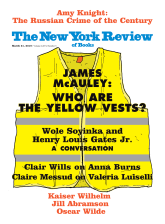Although Valeria Luiselli lives in New York City, she isn’t herself American—not by birth (she was born in Mexico), nor by upbringing (her father was a diplomat, her international childhood nomadic), nor, to a significant degree, in her literary influences and style. But the five books she has written so far expand our understanding of American literature. Lost Children Archive, her third novel, is the first that she has written in English (her first two were very well translated from the Spanish by Christina MacSweeney), and it is a passionate, if complicated, American novel—or, perhaps more accurately, a novel of the Americas.
For all their inventiveness, neither of her earlier novels could have led readers fully to anticipate this ambitious, somber, urgent new work. Her first, Faces in the Crowd (2014), is the artfully fragmented account of a young woman who, as she writes about her husband and small children, creates apocryphal translations of poems and extracts from an autobiographical narrative by the (actual) Mexican poet Gilberto Owen (1904–1952). Luiselli plays with reality and literary convention (in a manner familiar from European and Latin American fictions from Pirandello to Borges to Bolaño) and combines that play with an often ironic, intermittently autofictional recording of daily life’s more banal moments, in a way popularized in contemporary North American fiction by women writers like Sheila Heti or Jenny Offill.
Luiselli’s second novel, The Story of My Teeth (2015), is driven by the inimitable voice of Gustavo “Highway” Sánchez Sánchez, an auctioneer whose tall tales about the literary provenance of his own teeth (he claims one belonged to Saint Augustine, for example, and another to Virginia Woolf) and whose different styles of storytelling salesmanship engage the reader in a lively narrative dance. Filled with absurdist literary allusions (“My uncle Marcelo Sánchez-Proust once wrote in his diary…”), the novel was in fact commissioned by the Galería Jumex, an art gallery outside Mexico City, as a serial narrative for the workers at Mexico’s Jumex juice factory, part of an exhibition exploring connections between the gallery and the Jumex empire. In an afterword, Luiselli explains that “many of the stories told in this book come from the workers’ personal accounts—though names, places and details are modified.” The almost frothy quality of the book’s pacing arises in part, surely, from its conception as a serial: we are buoyed along by episodic comic surprise.
Between The Story of My Teeth and Lost Children Archive, Luiselli wrote a slim, memorable volume of nonfiction, Tell Me How It Ends: An Essay in Forty Questions (2017), expanded from an essay that appeared in Freeman’s magazine in 2016. (This was her second nonfiction book: her first, Sidewalks, from 2010, is an allusive and, again, cleverly fragmented series of meditations on topics ranging from Joseph Brodsky’s grave, to bicycling, to the empty spaces in Mexico City.) In the course of applying for permanent resident status in the United States, Luiselli and her family took a road trip in the summer of 2014, from New York to Cochise County, Arizona, near the US–Mexico border. The following year, back in New York, she became a volunteer interpreter in the federal immigration court. The essay reconstructs both Luiselli’s initiation into the world of immigration courts (including the lives of several of the vast number of children seeking asylum) and her family’s journey across the southern US by car. As Latin Americans, they attract questions from policemen, one of whom remarks sardonically, “So you come all the way down here for the inspiration.” She notes that “since 2006, around 120,000 migrants have disappeared in their transit through Mexico,” and that “between April 2014 and August 2015, more than 102,000 unaccompanied children had been detained at the [US] border.” Horrified by the statistics and the dark realities they represent, Luiselli writes:






